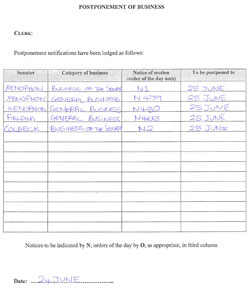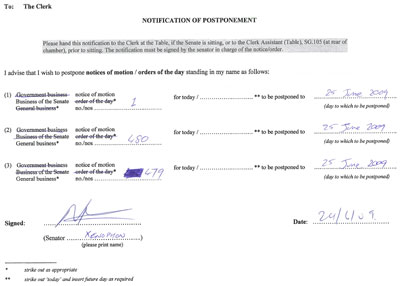67 Postponement of business
A senator who wishes to postpone a notice or order of the day of which the senator is in charge shall, before the time for postponement of business, deliver to the Clerk written notification of the postponement. At that time the Clerk shall read a list of such items, and they shall then be taken to be postponed accordingly, but, at the request of any senator, the question for the postponement of an item shall be put to the Senate for determination without amendment or debate.
Amendment history
Adopted: 19 August 1903 as SO 70
Amended:
- 13 February 1997, J.1447 (to take effect 24 February 1997) (incorporation of 1994 reforms to the routine of business)
- 30 November 1999, J.2143 (to take effect 1 January 2000) (adoption of current procedure)
1989 revision: Old SO 74 renumbered as SO 67, masculine pronouns removed and expression streamlined to remove redundant reference to divisions (in the same terms as standing order 66)
Commentary

To postpone business, senators fill out and sign a form to indicate which items of their buisiness they wish to postpone
Until 1999, individual senators who had notices of motion in their name, or who were in charge of orders of the day, moved individual motions to postpone those items of business and votes were taken accordingly:
At the time provided for postponement of business any senator may move without notice that any notice of motion standing in the senator’s name, or order of the day of which the senator is in charge on the Notice Paper for that day, be a notice of motion or order of the day for a subsequent day, and such a motion shall be put and determined without amendment or debate.
In much earlier days, as recorded in the 1938 MS, the President announced “I shall now proceed to the placing of business,” and notices of motion and orders of the day were called through in the same manner as formal motions. The President then asked, in respect of each one, “Is it desired to postpone or rearrange this business?” Government business orders of the day were called on as a whole. Although the same words are used by the chair today to indicate arrival at this point in the routine of business, the procedure is very different.
Early in 1999, the then manager of government business, Senator Ian Campbell (Lib, WA), concerned about the time being taken for giving notices of motion and dealing with postponements and formal motions, asked the Procedure Committee to examine ways in which these procedures might be streamlined and to consider particular suggestions for doing so. The Procedure Committee concluded that some acceptable streamlining of these procedures could be achieved without infringing the rights of senators.[1]

At the relevant time, the Clerk reads out a consolidated list of items to be postponed. Any senator taken may seek to have a vote on any of the items. Otherwise, they are taken to be postponed according to their terms
While it would be possible to save time by having party whips move several items together on behalf of senators, with any senator having the right to require that any particular motion be put separately, the Procedure Committee opted instead for a redesign of the procedure. Senators would be required to lodge written notification of their intention to postpone items of business and a list of these would be read by the Clerk at the time provided. The items would be taken to be postponed in accordance with the written notification but any senator could ask for the question to be put on any item to enable the Senate to determine its fate.[2]
The committee suggested that the revised procedure be tested before being adopted as a replacement standing order. Temporary and sessional orders were adopted on 29 April 1999 (J.815) and 30 June 1999 (J.1396), before being permanently adopted on 30 November 1999, with effect from 1 January 2000.
Senators, or party whips on their behalf, usually lodge a widely available form[3] but other written notification is also acceptable. Notifications are collated and announced by the Clerk. Copies are circulated by Senate officers to party leaders, managers and whips and independent senators, along with the day’s notices of motion, for the purpose of facilitating business consultations that occur each sitting day.
A motion to postpone business (other than a motion moved by a minister under SO 56) requires leave because the standing orders no longer permit such a motion to be moved without notice. A postponement motion moved by leave at any time other than the designated time is also regarded as being open to debate and amendment, as is any motion moved by a minister under SO 56.